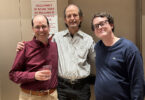You’ve returned from a big trip. I know that you don’t usually like to talk about these things, and you never do so. So I’m thankful that you could talk with the readers of our site about it in spite of your workload. As far as I understand, your trip was to the Australia-New Zealand diocese of the ROCOR. How long were you there?
Protodeacon Andrei Kuraev: Well, yes. For a few tabus in my life, I don’t keep traveler’s journals and I don’t talk about my impressions — because in most cases this will cause a problem. That is to say, this is such a complimentary genre, so it’s fine if I speak admiringly of what I’ve seen, whom I’ve spoken with; but if I speak otherwise …
I understand. This might upset people.
It happens that people get offended. Especially in my travels through Russia, being visitors from Moscow in the province. “What do you think about us?” This kind of questions. It’s very important to them. I don’t like self-reflections of such people. So you’re in the provinces — why be concerned what distinguished outsiders will say about you? It’s a mark of the parochial mentality.
I had a notable journey in August of this year [2013] through the parishes of Australia and New Zealand. I’m very thankful to Vladyka Hilarion [of ROCOR] and to Hieromonk Christopher, who is in charge of the Australian missionary division of the diocese, with whom I spoke by telephone just yesterday.
I have an issue with Orthodox Missionary vainglory — going to the ends of the earth, wetting one’s feet on the shores of the Pacific Ocean and looking on Antartica from afar. But in this case my purpose wasn’t missionary at all, for who was there to evangelize? I was dealing with people who are already members of strong Orthodox Communities. These are people who have much more experience than I do with church life, standing for the faith, suffering for it. So they couldn’t possibly be subjects of my real missionary activity. I was interested in observing and learning.
Throughout my life, I’ve been interested in such non-Muscovite Russians, who are not entirely familiar to contemporary Russian. There are types of the survival of Orthodoxy — Greeks or Georgians, Albanians and Arabs. One such type is the Orthodoxy that lives in the communities of the Church Abroad. These communities are different from one another. The church in Germany, for example, is altogether different from the church in Australia.
Can you say more about that?
Well, it’s obvious, completely obvious, that the emigration in Australia is comprised of Cossacks, while in Europe it is comprised of the upper-class intelligentsia with an infusion of people of Russian-Hebrew background. It’s a “dissident” emigration. Thus they have their own sorts of things to talk about in parish discussions, their own way of life, etc.
What you have in Australia is immediately more interesting to me, since I, being a Muscovite, am myself educated, dissident, and so on. That is to say I’m already familiar with the urban Moscow crowd. I grew up in it, so I don’t have to go to Munich to see it. But Australia isa place where you can see these old Cossacks, you meet all these old Semenovites [followers of Ataman Semenov]. This is just why this trip was so interesting, especially meeting people with such roots.
So that’s a very unique experience for you. That’s informative. So you visited practically all the parishes?
Well, not all. Only those on what’s called Australia’s Eastern coast.
What about the West?
I haven’t been there.
Are the parishes reasonably large? Are most of people born in Australia?
Yes, most of them.
How did the questions you were asked there differ from those you’ve heard elsewhere? Were the questions from the audience different or of the same sort as you’ve seen before?
I think the age of the internet has done away with this difference, and the questions are more or less the same. What was interesting for me, and so what I talk about here in Russia, is parish life, the organization of the parish. You see, the most exciting experience I had in Australia, aside from cuddling a kangaroo and all that, was when, at one of the parishes, I held in my hands the local parish newsletter, which contained an article about a recent parish assembly.
The primary purpose of this assembly had been to decide the complicated question of which brand of refrigerator to buy for the dining hall. Everyone had a voice. Such-and-such a lady said this, that one said something else. Of course, this is a question that any householder is competent to resolve. They talked about the energy efficiency of refrigerators, how much space it would take up, etc. Then finally they came to a consensus and chose a refrigerator.
What I like about this, you see, is that in Russia the parishioners don’t have the right to vote.
To tell you the truth, lately, I’ve frequently recalled a term of Oswald Spengler, from his “Decline of Western Civilization.” The term is “pseudomorphosis.” It’s a kind of geological layering, like when water has washed something away, or something has happened so some layer was washed off. It’s a geological term. There comes to be an empty space, and then this space is filled up with fresh lava. The lava is fresh, but it’s on a level which is very old, and everything next to it is old, and so its external form will look very old, while actually, it’s new. That’s what’s called psuedomorphosis in geology.
Spengler applied this term to culture. For him, the classic example of pseudomorphosis was the Rennaissance. That is to say that people thought that all they were doing was re-introducing or continuing ancient culture, while in fact, it was something utterly new. Neither Michaelangelo could visit Athens neither DaVinci ancient Rome. This was a completely new culture, but one that was never self-consciously new.
Another example of pseudomorphosis are the Russian Old-Believers at the end of the 17th century. They considered themselves to be the bearers of antiquity. In fact, of course, Archpriest Avvakum’s spirit, and his general view of the church and the world was something altogether new. In a way, it was a renaissance phenomenon. One can honestly say that a certain similar pseudomorphosis has happened with Russian Orthodoxy now. We wear the same clothes, go to the same temples, and repeat the same prayers, but quite a lot is different.
Here’s the simplest example. Recently a Moscow priest, one who’d seen a lot in his own century, said to me “off the record,” so to speak, “Fr. Andrei, explain to me why we talk so much about tradition and continuity in the Church — for tradition is continuity — and yet I’ve served for so many decades in Moscow and I don’t remember a case when a rector has died and the Patriarchate has appointed the second priest of the parish as rector. Always a priest comes from outside and utterly destroys all of the little local parish traditions — not the Typicon, but singing traditions, customs, etc. He brings in his own people and sows his own customs here.”
In some ways, this is visible on the hierarchical level. You see, in Russia, when Synod move a bishop from one see to another, it never happens that the new bishop and the departing bishop meet and spend a week together (in spite of the fact that this means two bishops in one city for a week), and the departing bishop introduces the new bishop to the priests, to the civil authorities, shows him the ropes, and then peacefully leaves. Instead, a new bishop usually arrives in totally desolated old see, where all the cars have disappeared and there’s no place to park, the doorknobs have hardly been turned, the chandeliers haven’t been raised, and so on. He has to start from nothing. When there’s no continuity even in such things, every new patriarch starts by re-doing the patriarchal residence, since he has different tastes, a different style, etc. So this is also something to talk about.
And amidst all of these psuedomorphoses, we have conversations about our “sobornost,” the voice of the nation, and so forth. But in the life of the Moscow Patriarchate, there is no voice of the nation in the church. The priest is practically nothing before the face of the bishop, the bishop is nothing before the face of the patriarch and synod, the parishioners before the face of the priest. We are unable to convene a normal, really effective parish council. As far as electing a representative to the Local Council, we don’t even know who the members of the parish are because there is no nominal membership.
Any election starts by working out a map of districts, and people are assigned to one district or another. A list of the electorate is composed. Then you have the election. We don’t have this. We have no understanding of the limits of the parish. Before the revolution, there were such boundaries, but no more. There are no lists of parishioners.
Accordingly, while I’ve been a deacon for twenty years, give or take, I’ve never been to a parish council meeting! I’ve been to a few hierarchal councils but never once to a parish council meeting. In my opinion, it’s easier for one to wind up at a session of the Synod than at a parish meeting! So what happens is that people donate to the parish in one way or another, but are deprived of any right of control, and so forth.
So I like very much what I see in the parishes abroad, whether in Australia or Germany, where people sign up to be members of the community and thus they take on great responsibilities. They become financially involved, but in exchange for this they receive rights. So if I only want to go and pray and receive Communion, I don’t have to give a kopeck to the temple. But if I want my voice to be heard concerning issues — whether we’ll do this or that, whether we’ll send our children on pilgrimage or, say, paint the church walls — well then, let’s talk about it!
Or perhaps we’ll get a new choir director. Perhaps his musical style will suit us, but maybe we’ll want something else. If I want to discuss these issues, I should purchase the right. But how do I purchase it? I don’t simply buy it with money. The financial donation is my demonstration that I don’t consider such issues alien to me.
In this way, financial participation is the life of the community is like a confession. That is to say that when I confess to a priest, to another person, by such an act I myself am alienating my sins from myself. Psychologically, most of all, it means that I’m no longer cherishing my sins within myself, but I’m trying to pull out a splinter. If I’m storing this sin within myself, then it’s an intimate part of me. But when I tell someone else, it means I’m weighed down by it, I want to be delivered and I’ll naturally cry out, “Help me! Help!”
But [with donating to the parish] the logic is reversed. If I want to take up parish life, be a part of my home temple, then accordingly I make a sincere offering to affirm our familial relation. I receive the right to elect delegates to the diocesan council, or the diocesan council, or even higher to the local council or the all-diaspora council.
So I liked these parish trivialities [the refrigerator] very much. Of course, there are also disadvantages. You see, I haven’t found the ideal situation anywhere. Here [in Moscow] there’s an extreme, the extreme of our muscovite life. This is a power vertical that isn’t inclined to recognize or take account of anyone or anything. This is extreme, but let’s take a counterexample.
One mustn’t turn Christianity into Marxism. That is to say we shouldn’t think that people are saved by class distinctions, that all the rich are in hell and all the proletarians are in paradise. That’s not how it is. We understand how the rich can sin, but the poor man, of course, can sin through jealousy and hatred. When nowadays poor people walk by the windows of rich boutiques and curse saying, the bourgeoisie can buy these things for themselves and we poor people can’t, and so on. So there’s a sin of the poor man. It isn’t unavoidable, but the threat is great, and there are other things like it. Interest [involvement in parish affairs] isn’t dangerous, but the scent of power is an awesome thing and can intoxicate anyone, even the church warden. And this is what one frequently hears about and sees in the parishes abroad.
But I say this not as a distinction vis-a-vis Moscow church life. It’s a common problem. It’s the issue of the priest having no rights, that is when the reforms in church life from the Khrushchev era are carried out in full, when the priest is just a minor servant in the parish. They pay him a wage, give him some money and send him on his way, telling him not to have any more influence on their spiritual life.
I see. So we’re talking about how to establish a healthy balance.
Yes. That’s why at one of my meetings in Australia I said, “You know, I have this strange feeling that your priests are like kangaroos in raias.” Then they explained to me that Australians themselves don’t like kangaroos. Foreigners think that kangaroos are cute. They very much want to pet them and hug them. So, of course, I didn’t intend and negative associations here.
But you know what I had in mind. There are advantages and disadvantages. In these Australian priests I didn’t find any machismo, no overbearing spirit. There was none of that. On the one hand, that’s a great advantage. But at the same time there’s a problem of indecisiveness and malleability.
Of course, a priest needn’t interfere in discussions about the refrigerator. But the thing is that I know of other examples where the priest is excessively dependent on the parish. He begins to be careful about rebuking this or that sin. He understands that, “If I speak about this or that sin now — well, the community is small. Everyone will understand who among us is being exposed as involved in this sin. They’ll all look at him. And if this happens in the parish then, again, they’ll all consider that I’m calling him to account, and that this is how I use my right to preach in church. Oh, Lord, ‘what will Princess Maria Alekseevna say?’ It’s better to keep silent.”
This is partly the problem of a small community, you might say.
Yes. It’s the problem of a small community wherein are very many ambitions. Such closed collectives are gossip factories. Every convent, most of all, produces gossip from their own point of view.
Here’s how such small parishes abroad and in Moscow can be compared from the priest’s point of view. I myself the luxury of choosing whom to converse with. I can avoid meeting someone, cross someone out of my life, or even simply say, “Don’t come to my church. Moscow’s a big city.” This is like the time of the Apostles, when if they don’t receive you in one house you would go to another. There are advantages and disadvantages to this. On the one hand, the priest can decide himself to lose people. In a parish of many thousands, in a city of millions, he can allow himself the luxury of losing people, and “the brigade won’t notice that a soldier’s been lost.” On the other hand, this is likely to establish a certain internal atmosphere both for the priest himself, and for his community.
When an airplane is flying from Australia to New York and there’s some drunken debauchee on board, they cannot drop him off somewhere in the ocean, and he’ll poison the lives of everyone around him. That’s why I acknowledge the right of the Church to pronounce anathema — the right to reject communion with someone. Again, to go between the two extremes is the golden mean. But I feel sorry for the priests abroad, because they are deprived of this right in most cases. In a very small community, everyone has great degree of dependence on everyone else. Therefore in this case we need to know how to have patience with one another.
This is difficult and painful and unfortunately, it’s far from always effective and fruitful. There’s an old Chinese torture where they put someone with a corpse and the two decompose together. The dead body infects the healthy man. That’s why patience isn’t always the best attitude. It doesn’t always lead to the best results. It might be the main cause of the problems. So, let’s say, I’m telling Russia to admire what there is abroad, and I’m telling those abroad to admire what we have in Russia.
Conducted by Deacon Andrei Psarev
Photos from the trip: http://diak-kuraev.livejournal.com/512858.html











